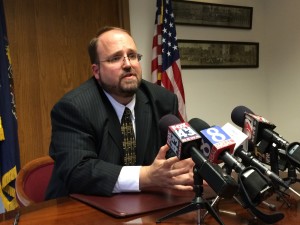Is Gene Veno, the state-appointed recovery officer for the Harrisburg school district, serious about improving Harrisburg’s schools?
Mayor Eric Papenfuse first raised this question on April 3, when he announced he had petitioned the education secretary for Veno’s removal. He said his request was based on an unsettling meeting he’d attended in late February, during which Veno apparently suggested that the district would never meet his plan’s academic goals. (Veno disputes this, though state Sen. Rob Teplitz and state Rep. Patty Kim, who were also at the meeting, backed up Papenfuse’s account.)
Then, last week, Veno released an update to his plan that changed its academic goals. In particular, the new plan reduced targets for student proficiency in reading, math and science, as measured by standardized test scores. The difference was only a few percentage points, but it was enough to rankle Papenfuse, who saw an attempt to quietly lower expectations without a full public vetting. He wrote an open letter to the acting education secretary, Carolyn Dumaresq, accusing Veno of having “watered down” his original plan.
“I feel fundamentally that the new plan has shifted the goalposts,” Papenfuse said Tuesday night in city hall. He suggested the amendments embraced “mediocrity,” adding, “It’s a big deal.”
How big a deal is it? One difficulty in assessing the new academic targets is that the state, in the year since the original plan was drafted, has changed its measurements of school quality. In October, the Department of Education launched a new system of “school performance profiles,” which use weighted averages to rate schools and districts on a 100-point scale. The profiles are meant to provide a balanced look at school performance, combining points for “achievement” (how high student test scores are in a given year) with points for “growth” (how much students improved since the previous year).
These combined factors—achievement and growth—can provide for a more nuanced picture of school performance. In Harrisburg, for instance, nearly every school does poorly in raw test scores, yet, at the same time, nearly every school meets (and, in many cases, exceeds) expectations for annual growth. But the performance profiles include yet another measure of public schools: they also set annual targets for improving test scores, referred to, in characteristically eye-glazing language, as “indicators of closing the achievement gap.”
These targets are the subject of Papenfuse’s claim about benchmarks being “watered down.” The state defines the achievement gap as how far a school fell short of 100-percent proficiency in the 2012-13 school year. The state then applies a formula to come up with annual targets for “closing” the gap (actually, the targets are for cutting the gap in half within six years). For instance, applied to Harrisburg’s district-wide proficiency in math, which was 38 percent in 2012-13, the formula produces an annual target of a 5.2-percent increase per year.
This is where the new recovery plan has lowered expectations. Instead of demanding the full 5.2-percent jump in math proficiency in 2014, Veno, the recovery officer, has asked for a more modest climb of 3.64. Similar reductions were applied to the targets in science and reading. These new targets represent only 70 percent of the state’s recommendations, though the plan does ratchet them up towards full achievement of state goals by 2016.
So, to return to the original question: are these targets a sign that Veno has lost faith in the district, or is the mayor’s letter petty squabbling? The difference between Veno’s new goals and the state’s, as I wrote above, is only a couple of percentage points. On the other hand, even the state goals fall short of the original recovery plan, which called for annual gains in proficiency of up to 7 percent.
But the recovery plan’s goalposts, moving or otherwise, are only a partial measure of its academic seriousness. Even reduced targets are still just targets. The question for the recovery plan is whether it helps the district reach them.
Veno’s plan, at least on paper, has promises on this front, including reinstating full-day kindergarten, installing a system of consistent feedback between the superintendent, principals and teachers, and overhauling the school curriculum. But there’s also discouraging evidence regarding the implementation of these goals.
The original plan included a deadline for the curriculum overhaul of Aug. 15, 2013, in time for the current school year; in the amended plan, the deadline is Aug. 11, 2014. The plan’s financial objectives, including union concessions, were achieved in a matter of months (though, as it turned out, on the basis of shaky accounting). The delay on the academic front might tell you something about Veno’s priorities. (Since Monday, Veno has deferred to the Department of Education’s press secretary for comment. Neither the department nor Harrisburg school district officials responded to inquiries Wednesday.)
The beginning of this article asked if Veno was serious about academic improvement. Perhaps more to the point is the question of whether he can be serious about budget cuts and academic improvement at the same time. Nobody seems particularly keen to confront this question, and for good reason. Doing so would require admitting that Veno’s office, and the legislation that created it, has two irreconcilable goals: spending less on public education, and getting more out of it.
This story has been updated to include information about requests to Veno for comment.





